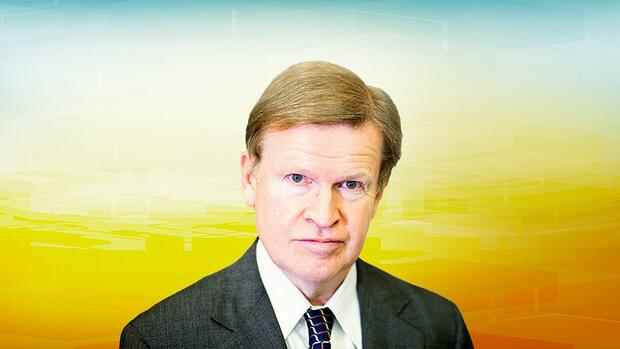Economic and financial policies tend to move back and forth like a pendulum. The euphoria about the power of government action is usually followed by setbacks, disillusionment and less ambition. The euphoric “can do” rhetoric gives way to prohibition rules and restrictions. This is where many developed countries are at the moment: After a period of carefree spending, there is increasing resistance to further government expansion.
Earlier setbacks in the political pendulum are remembered today as historic turning points. Take the 1970s, when there was initially enormous confidence that governments could solve any problem with Keynesian demand management.
The turning point came in 1976 when British Prime Minister James Callaghan admitted in a speech at the Labor Party Congress: “We thought that spending money could break out of a recession. – I tell you in all frankness that this possibility no longer exists. “
In the decades that followed, a new orthodoxy emerged centered on deficit reduction, debt limits and budgetary rules. As British Prime Minister Margaret Thatcher emphasized in the 1980s, there was “no alternative” – a slogan that German Chancellor Angela Merkel then used during the euro zone debt crisis.
Top jobs of the day
Find the best jobs now and
be notified by email.
At this point the political cycle had already turned again. After the global financial crisis of 2008, governments initially focused on common budgetary stimuli. But starting in 2010, there was again concern about the level of debt and the stimulus measures were ended. This new thrift then came at a considerable economic price, which in turn led to a renewed consensus against restrictions and in favor of spending to promote the economy.
With the response to the Covid-19 pandemic, this development entered a new round: At first, any level of government spending seemed appropriate or even necessary to alleviate the brutal and destructive consequences of the lockdown. Nobody could escape this general economic assessment. Government spending on vaccine development was uniquely effective, generating massive economic benefits, and preventing myriad deaths and expensive hospital treatments.
Expectations of the state grow with government spending
The fact that vaccines were available so quickly resulted in a general euphoria about the transformative potential of public spending: more and more people expected the public sector to repair the frayed social structure and to spend even more on it. Concerns about traditional macroeconomic boundaries, economic cycles and output gaps have been brushed aside.
Despite the bleak circumstances of 2020, then-US President Donald Trump received significant approval to use the power of government spending to the full. Millions of US households received stimulus checks that, which was quite unusual, were emblazoned with the President’s signature.
British Prime Minister Boris Johnson and his conservative colleagues were also able to achieve a spectacular election victory in December 2019 with their promise to revitalize England’s ailing northern industrial areas. They promised that whoever voted for the Tories would get a factory.
This “can do” model was a belated reaction to the logic of interest rates and debt during the 2010s – when governments could borrow money for free due to low interest rates – and spread around the world. The economic response to Covid-19 was similar to mobilizing for war, creating the impression that all it takes to win is acting together – no matter what the cost.
Can the debt ever be paid back?
But wars and their duration are fundamentally unpredictable. A famous example of this is the First World War – which Christmas 1914 was far from over. Wars, like pandemics, can go on and on, raising questions about the amount of debt that is accumulated in the process. Can they ever be repaid?
Wars and pandemics often provide spectacular examples of mispending. In the face of existential uncertainty, a certain amount of waste is inevitable. Ultimately, however, it is also inevitable that everything has its price: War spending prevents other useful investments.
Debates about whether government spending is appropriate are repeatedly accompanied by political scandals – many of which can have a transnational effect. The most recent example of this (which can serve as a warning to lavish autocrats around the world) comes from Austria, where Sebastian Kurz resigned as Chancellor after accusing himself and his political allies of using government funds to obtain positive media coverage.
As a politician who built his career not on political ideas but on charisma, Kurz reminds us that today’s budget debates are very personalized. In 1976, many observers attributed Callaghan’s sudden change of heart to fiscal straightforwardness to the intellectual persuasiveness of his son-in-law, the economist and journalist Peter Jay.
Financial policy is important: see traffic light negotiations
Today, political uncertainty in the United States can be traced back to the stubborn personalities of Senators Joe Manchin from West Virginia and Kyrsten Sinema from Arizona. In Germany, on the other hand, FDP leader Christian Lindner and Greens leader Robert Habeck are scrambling for the important office of finance minister. And in the UK, a rivalry is emerging between Johnson and Treasury Secretary Rishi Sunak.
The emphasis on personalities and scandals may be part of political theater, but it is actually out of place. Governments face massive problems and urgent tasks: They must contain the virus and prevent catastrophic climate change.
None of these goals can be achieved simply by spending indiscriminately. They require precisely coordinated and calculated measures. In the face of this colossal challenge, there is nothing worse than wasting limited resources or spending money just for the sake of spending.
The question is therefore not how many funds are available, but rather how they can best be invested in order to ensure a sustainable future that is worth living in. We need less gossip and more accuracy of fit.
The Author: Harold James is Professor of History and International Affairs at Princeton University.
More: 179 billion euros more: the state can count on a strong tax increase by 2025
